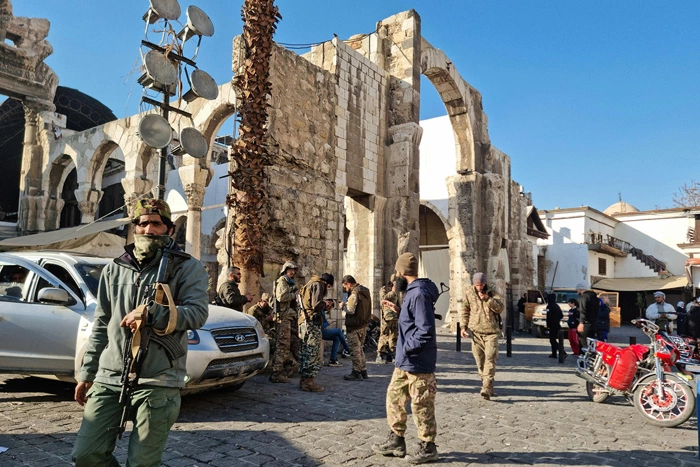
Christians in Syria face ‘uncertain, perilous future’ under HTS, persecution watchdog warns
By Anugrah Kumar, Christian Post – Sunday, December 8, 2024
Christians in Syria confront an uncertain and perilous future under the control of Islamist-led rebel forces, a human rights group has warned. The city’s minority Christian population, significantly diminished by years of civil war, now grapples with fears of escalating threats and restrictions.
Islamist rebel forces, led by Hay’at Tahrir al-Sham, captured Aleppo about a week ago, followed by Homs and Damascus late Saturday night in a sweeping offensive that toppled Syrian government forces. Bashar al-Assad resigned and left the country on a flight to Russia on Saturday night.
Since Hay’at Tahrir al-Sham’s takeover of Aleppo, many Christians have fled, leaving behind a small but resolute group trying to maintain their faith and traditions.
“The coming days and weeks will be crucial for the fate of [the] Christian community,” said Jeff King, president of International Christian Concern, in a statement shared with The Christian Post. “Christians, with roots stretching back nearly two millennia, now face an uncertain and perilous future.”
Bread shortages have worsened, and drinking water remains unavailable in several areas, Catholic News Agency reports as being among the hardships residents are facing.
Curfews imposed by the militant group from 5 p.m. to 5 a.m. further restrict daily life, leaving many residents, including Christians, feeling confined and vulnerable. Small vans distributing free bread and water in some neighborhoods offer limited relief.
A key highway between Damascus and Aleppo has also been blocked, leaving residents with only a congested and hazardous alternative route, according to CNA.
The isolation has claimed lives, including that of Dr. Arwant Arslanian, a Christian physician killed by sniper fire while attempting to flee the city, reported the Facebook page of Armenians of Syria.
A bus carrying young Christians was also stranded on the Aleppo Road, later finding refuge at the Syriac Orthodox Archdiocese.
Many Christian leaders have remained in the city, providing spiritual guidance and practical support to their communities.
Syriac Orthodox Metropolitan Bishop Mor Boutros Kassis and other Christian leaders have been communicating through social media where they held prayers and liturgies. They are encouraging Christian residents to face the reality with awareness, courage and faith, he was quoted as saying.
Franciscan Father Bahjat Karakach, representing the Latin Church, acknowledged, “The Church knows no more than the people do.” It’s up to individuals and families to decide if they want to stay or leave Aleppo, he stressed. “No one can make it on behalf of another. We friars are staying and waiting to see how things unfold,” he was quoted as saying.
Meanwhile, the Islamist faction, an offshoot of al-Qaeda, has pledged to protect civilians, including Christians. HTS leader Abu Mohammed al-Jolani visited Aleppo’s citadel and stated, “Aleppo has always been a meeting point for civilizations and cultures, and it will remain so, with a long history of cultural and religious diversity,” as reported by Al-Monitor.
Despite assurances, fears persist among Aleppo’s estimated 30,000 Christians, down from hundreds of thousands before the Syrian conflict began in 2011.
Switzerland-based group Christian Solidarity International responded to the assurance given by HTS, saying, “HTS’ ideology and history give religious minorities in Aleppo serious reason to doubt these promises.”
HTS has often targeted Christians throughout Syria in violent attacks and kidnappings, repeatedly killing Christian civilians and confiscating their property, CSI explained.
“In the Salafist worldview that animates HTS, Christians are not heretics to be destroyed (like the Alawites and the Druzes), but ‘people of the Book’ — followers of religions that were revealed before the coming of the [Islamic] prophet Muhammad. In lands ruled by Islam, they should be made dhimmis — a protected people who are kept in legal subjugation and pay an additional tax called the jizya,” CSI continued.
“Until now, HTS has avoided imposing dhimmi status on Christians in Idlib by referring to them as musta’min, or temporary residents,” the group acknowledged. “But how long will HTS maintain this distinction?” CSI asked.
However, Archbishop Boutros Marayati of the Armenian Catholic Church sought to reassure worshipers during a Mass, telling them, “Do not fear, dear brothers. We have received assurances from all parties. Continue living normally, and everything will remain as before, even better,” as quoted by AL Monitor.
The Christian community in Aleppo has historically aligned with the Syrian government, which President Bashar al-Assad, a member of the Alawite minority, has positioned as a protector of minorities.
The rebel takeover represents a dramatic shift, stirring memories of prior persecution during the Islamic State’s reign over parts of Syria. IS systematically targeted Christians, destroying churches and engaging in mass kidnappings before being defeated in 2019.
